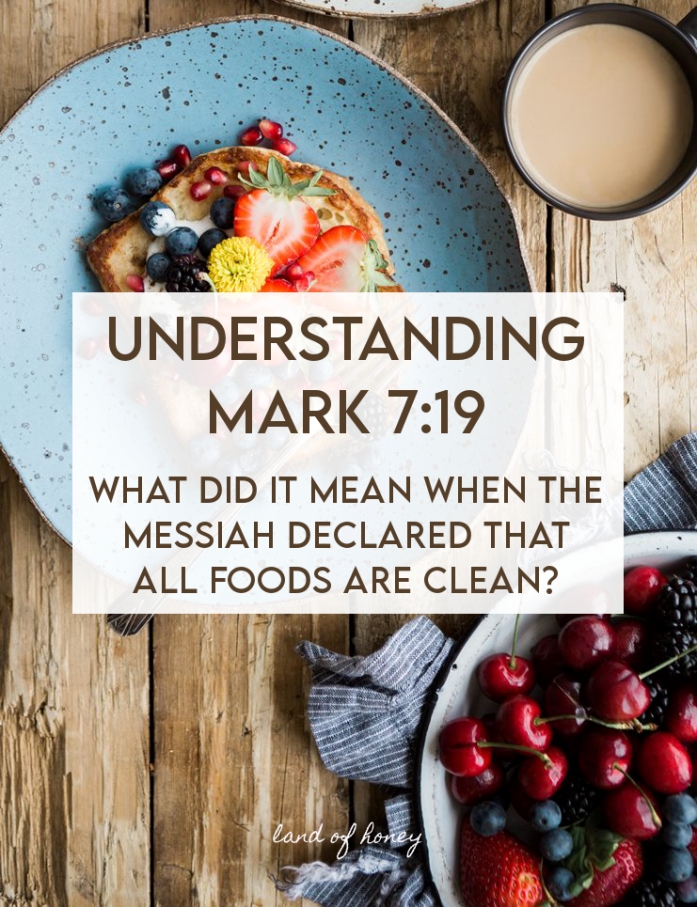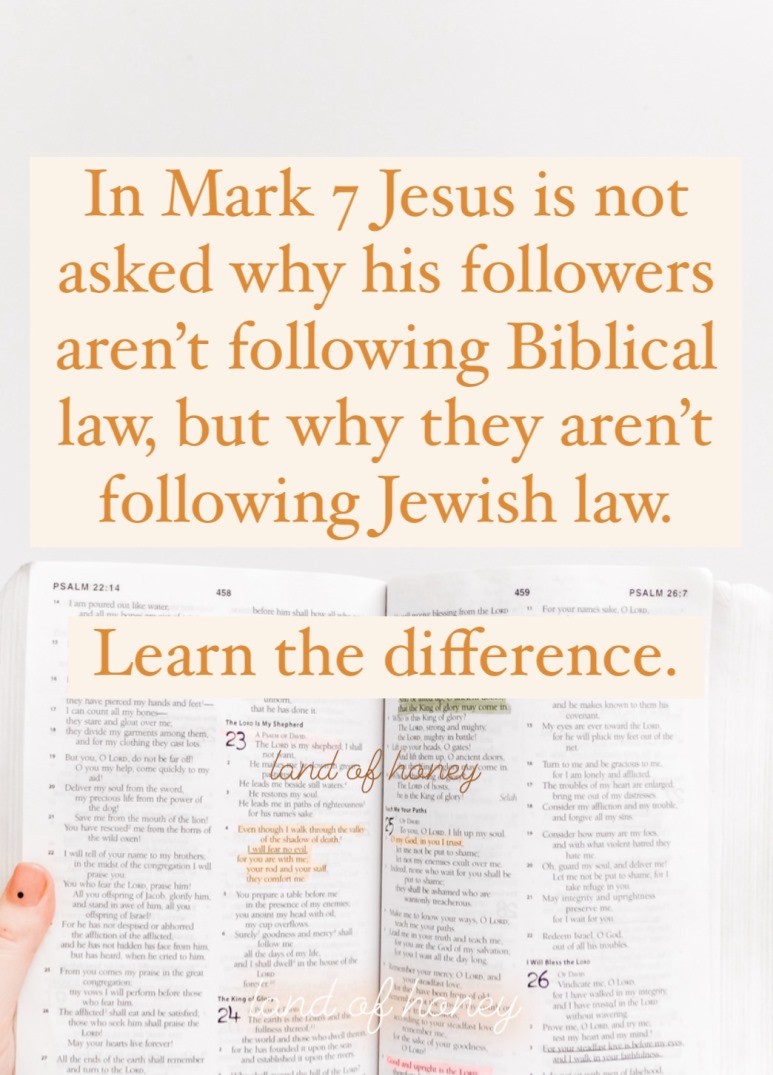Because I come from a Christian background, I have heard so many times that Galatians says that we are set free from the pointless and burdensome instructions of our Creator. These are some of the verses that used to confuse me. Let's take a closer look to see what Scripture really is saying in these passages.
Taking a closer look at difficult Galatians verses:
Titus was not compelled to be circumcised. -Galatians 2:3
This verse is talking about circumcision and does not mean that Titus wasn't compelled to follow other commandments in Scripture. Circumcision is a weighty topic and one that we won't fully delve into in this article. Remember that Paul did encourage Timothy to be circumcised later and we have no evidence of either of them or Paul disregarding Scripture's instructions in other areas.
Peter was at fault for separating himself from Gentiles. -Galatians 2:11
Peter was at fault because the Bible doesn't say he should do this. The idea of separating from Gentiles is a man-made idea, not something commanded by God. Which is why verse 12 expressly mentions that he withdrew from Gentile believers because of fear of others. He was fearing man's traditions and rules (Judaism's laws in this case) in place of YHWH, which is what Paul called him out for.
"Why would you compel a Gentile to live as a Jew?" -Galatians 2:14
It's important to realize that Paul no longer sees his faith as part of Judaism (in 1:13 he says that Judaism was his former way of life). So yeah, why would he expect Gentiles to live as Jews who observe literally thousands of rules not found in Scripture? The context of this alongside his rebuke of Peter keeping Jewish law tells us that Paul does not think believers should follow manmade law, but he's not saying that all believers shouldn't keep God's commandments.
"Man is not declared right by works of law." -Galatians 2:16
The point of having God’s laws was so that we would know how to honor him with our daily choices. Keeping the law was never meant to erase sins. Salvation is a free gift, regardless of my ability to perfectly serve God. However our actions should reflect our faith!
"Through the law, I died to law." -Galatians 2:19
An easier to understand rendering of this verse would be, "Through Scripture, I died to the Levitical priesthood." It's significant that Paul says through the law or through Scripture, because he can see that the change from the Levitical priesthood back to the Melchizedek is something that Scripture teaches. He says he is dead to the system of animal sacrifice because it can no longer do anything for him.
"If righteousness is through the law, then Messiah died for nothing." -Galatians 2:21
This isn't discrediting either Biblical law or the Levitical priesthood, but rather speaking a quite obvious truth. If we didn't need the Messiah for salvation, then what was the point in his being killed? If the Levitical sacrificial system was all we needed then that would have been an easy decision for YHWH to continue that rather than subject the Messiah to torture and murder.
"Does the Spirit come by works of law or by belief?" -Galatians 3:2
Did the Levitical system lead to an outpouring of the Holy Spirit? It did not, simply because the Levitical system is the not the fullness or best of YHWH's plan for mankind. That is not an insult to the Levitical temple, but an admonishment that our faith shouldn't stop there.
You need belief to be a son of Abraham. -Galatians 3:7
It's not about your bloodline, it's about placing your faith in the Messiah and serving him as Scripture teaches.
"Cursed is everyone who does not continue in all the law." -Galatians 3:10
Would Paul have bothered bringing this up if he thought we shouldn't keep any of the commandments and were off the hook of being cursed? I don't think so, and his phrasing is quite telling...he expects believers to have a question about doing 'part' of God’s instructions because he expected them to follow the commandments given in the Book of the Covenant, without keeping the Levitical Temple system in effect. If it weren't for the Messiah, we would be cursed by not participating in the Levitical system. But now we have the Messiah and he set us free from the curse that comes from stopping Temple sacrifices.
"No one is declared right by the law." -Galatians 3:11
You can't sacrifice enough animals to be declared right. The blood of animals does not take away sins (Hebrews 10:4). That's not an insult to the Levitical priesthood, merely an admission that Jesus’s blood is superior. And of course we aren't declared right by our works either, but that doesn't mean YHWH doesn't want us to live a certain way.
"Law that came 430 years later does not annul a previous Covenant." -Galatians 3:17
Did you know that most of the commandments for how to live were given before the Levitical priesthood was established? Instructions on the Sabbath, the set apart times, and clean eating were all spoken of well before the Israelites wandered in the desert. Those things aren't annulled or done away with because of the change in the priesthood. This sentence shows us that Scripture makes a distinction of the commandments for how to live and the commandments for the Levitical system. They are not inextricably linked together. This also tells us that the "Two Laws" are both from Scripture, and Paul is not talking about the oral law (Judaism's man-made rules).
This law was added because of transgressions... -Galatians 3:19
Added is a key word here. God had been giving instructions on how to live since “Don’t eat the fruit of that tree.” We see commandments given far sooner than the Levitical system. So this is about the Levitical priesthood being added after the transgression of the golden calf.
"...until the Seed should come to those this promise was made to." -Galatians 3:19
Until the Messiah comes! The Levitical sacrifices were made until the Messiah. This passage is talking about animal sacrifice and circumcision, but Paul is not saying that the rest of the instructions were just until the Messiah. We see the Messiah and his followers (Paul included) keeping the commandments throughout the New Testament.
The law is not against the promises of God. -Galatians 3:21
Meaning that his instructions go with his promises. You don't throw out the instructions to opt for the promises. They are all part of the same plan.
Jesus was born under Levitical law. -Galatians 4:4
Messiah was born when the Levitical system was still in operation, in order to redeem those who were under this priesthood. This is both a statement of fact (that the Temple was running when he was born), and a reminder that he comes to us where we are.
Becoming enslaved again...observing Gentile ritual days. -Galatians 4:10
Please see that this passage is about turning back to cultural holidays and man-made traditions, not about keeping the Biblical set apart times! Verse 9 talks about turning away from YHWH. Would it make more sense to view celebrating a feast of Scripture as turning away from the Living God, or turning to man-made holidays as turning away from the Creator?
Two covenants: free woman/slave woman allegory. -Galatians 4:24
Take note that these women are from Abraham's time, including the free woman. The Melchizedek priesthood was in effect during Abraham's time, while the Levitical system didn't come into place until hundreds of years later. YHWH's intention was always for his people to have the free woman covenant, but that covenant was rejected by Israel at the sin of the golden calf. The Messiah's sacrifice restores us to the original free woman covenant, including the many commandments on how we are to live such as celebrating the Biblical holidays, not consuming animals that Scripture doesn't permit, and honoring the Sabbath day.
Messiah has made us free from the yoke of slavery. -Galatians 5:1
True freedom only comes from the Messiah. And going back to the allegory of the free woman and the slave woman, the Levitical priesthood is the slave woman.
Declaring yourself right by animal sacrifices severs you from the Messiah. -Galatians 5:4
Yes, saying that your sins are covered because of an animal sacrifice is deeply insulting to the Messiah! But that's what severs you from him; note that this verse doesn't say, "Honoring the Sabbath day severs you from Messiah," or "Keeping the commandments cuts you off."
"Do not use freedom as an occasion for the flesh." -Galatians 5:13
Freedom and forgiveness don't make it wise to live foolishly. The Messiah didn't set us free from sin so that we can do whatever we want without consequence.
"The entire law is completed in one word, love your neighbor as yourself." -Galatians 5:14
This is a summary of the instructions we are supposed to be keeping. Think of it as the description on the back of a book - here's what it's about, see inside for more.
"If you are lead by the Spirit, you are not under law." -Galatians 5:18
A better rendering of this would be that if we are being lead by the Spirit, we won't return to the Levitical system of animal sacrifice. The Holy Spirit accepts Jesus's blood offering as superior to the blood of bulls and goats and will not lead you to resume animal sacrifice. This verse is not saying that the Holy Spirit would lead us away from the word of YHWH or his instructions. Paul has just spoken on the law telling us to love our neighbor, it would make no sense for him to mean 'law' in the same context here...if you are lead by the Spirit you won't love your neighbor? That doesn't fit at all with Scripture.






















.JPG)